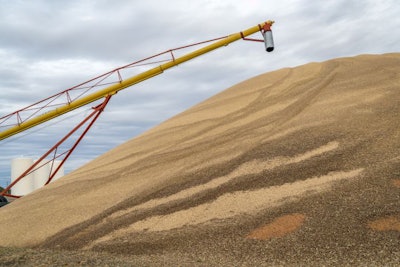
China has imposed a temporary 179 percent tariff on U.S. sorghum imports, a grain used in animal feed and to sweeten baijiu, a liquor popular in China.
China is the world’s largest importer of sorghum from the U.S., and imported 4.76 million tons of the grain, worth about $1.1 billion, in 2017.
U.S. companies will have to put up a 178.6 percent deposit on the value of sorghum shipments to China, which says the U.S. is dumping sorghum on the Chinese market, hurting domestic producers. U.S. traders say the deposit is enough to halt sorghum trade altogether and inflate prices on alternatives, such as barley.
China launched an anti-dumping investigation in February and said it found its sorghum industry was “substantially damaged” by U.S. sorghum imports being dumped into the country. It said it would issue a final ruling later but did not say when.
“U.S. sorghum is not being dumped in China, and U.S. sorghum producers and exporters have not caused any injury to China’s sorghum industry,” the National Sorghum Producers said in a statement. “National Sorghum Producers, alongside our producers, stakeholders and partners, has cooperated fully with China’s anti-dumping and countervailing duty investigations, including submitting several thousand pages of data demonstrating conclusively that U.S. sorghum is neither dumped nor causing any injury to China. None of this information appears to have been seriously considered or used in today’s preliminary determination, which is neither fair nor appropriate.”
However, Richard Brock, president and CEO of business management consultant Brock Associates, said he thinks the move by China is more of a warning.
“I think this is just more of a scare tactic and kind of a warning," Brock told WATTAgNet. "They picked a commodity that doesn’t really amount to that much. When it comes to sorghum exports, 66 percent of our total usage is exports, so it’s a big export commodity. And out of that, so far this year, 89 percent of it has already been shipped to China. So, their purchases to date of sorghum already match what they normally do in a whole year and I don’t think they probably intend on taking any more. So it’s not going to change the sorghum industry here; it’s not going to change what they buy from us.”
China has already threatened a 25 percent levy on 106 U.S. product imports worth $50 billion, including sorghum. Among the items China included in its list are U.S. grains and feedstuffs, such as yellow and black soybean, corn, corn flour, durum wheat, wheat and mixed wheat, brewing or distilling dregs and waste, uncombed cotton and cotton linters. The list also includes pork and beef products, among others.
The trade war has quieted this week, as the Trump administration’s threats of tariffs against China are still in the planning stages.

















